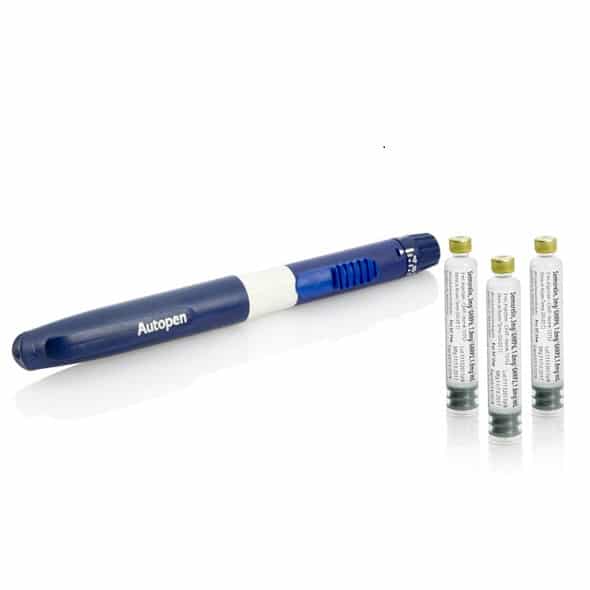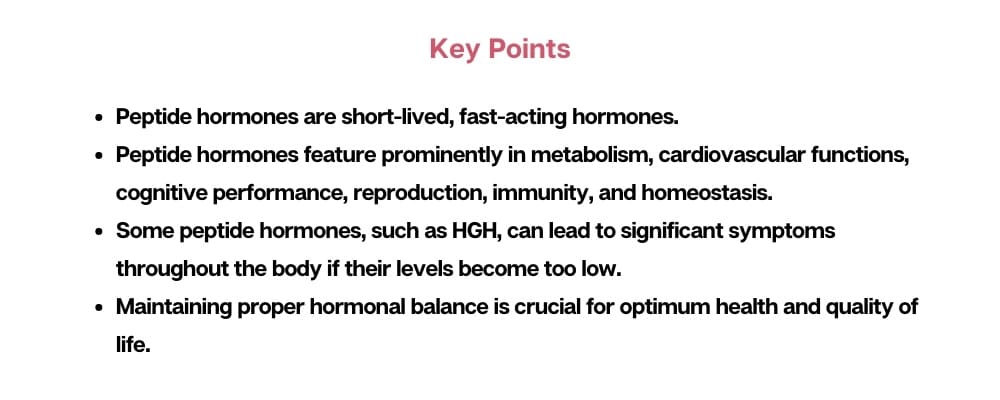
Peptide Hormones: What Are They and Why Are They Important?
Table of Contents
Peptide Hormones: What Are They and Why Are They Important?
Peptide hormones are one classification of the various chemical messengers circulating in your body. These chemicals regulate, control, or support the functions that keep you healthy, focused, and enjoying life.
Other hormone types include amino acids and steroids. Eicosanoids are the final category of hormones, which act on cells near their production site rather than traveling throughout the body.
Peptide hormones have some of the most significant roles in the adult body. These actions include regulating functions as widespread as metabolism, cognitive performance, heart health, immunity, cellular regeneration, sexual performance, and supporting the production of other essential hormones.
The review of peptide hormones below also highlights some of the activities of essential chemicals such as human growth hormone therapy (HGH), leptin, and thyroid-stimulating hormone (TSH).

What Are Peptide Hormones?
More than 50 different peptide hormones circulate through the bloodstream. These vital chemicals consist of small chains ranging from 2 to 50 amino acids. Protein hormones are longer chain peptides (50 to 100 amino acids), with polypeptides being the longest of the amino acid chains, consisting of over 100 amino acids.
Peptide hormones are short-lived and fast-acting, delivering their signals to receptors on cellular surfaces. Unlike steroid hormones that can diffuse through the cellular membrane, peptide hormones bind to surface receptors to activate a second messenger to produce a rapid function or metabolic change.
While most peptide hormones circulate freely throughout the bloodstream, some, such as insulin growth factor 1 (IGF-1), attach to binding proteins. These water-soluble hormones break down upon signal delivery, ending their actions until the next release.
Why Are Peptide Hormones Important?
Peptide hormones feature prominently in the regulation of metabolism, immunity, homeostasis, cardiovascular functions, reproduction, and cognitive performance. These are only some of the many areas of the body influenced by peptide hormones.
As science advances with new technological breakthroughs, we discover previously unidentified hormones, such as the peptide hormones adropin, apelin, elabela, and irisin, among others, that play a role in metabolism and homeostasis. The more we learn and know about peptide hormones, the better we can improve physiological functions throughout the body as we age.
Hormone replacement therapy, or HRT for short, helps restore balance when a particular hormone is in short supply. Some peptide hormones, such as HGH, have far-reaching consequences if their levels become too low. HGH deficiency can lead to premature physical aging, more frequent illness, stress, depression, sexual decline, poor heart health, weight gain, dementia, osteoporosis, and more.
Maintaining peptide hormone balance as you age can help your body function optimally.
What Are the Types of Peptide Hormones?
There are far too many peptide hormones to include in one report. We have chosen some you should know and understand to explain in further detail below.
Oxytocin
As a smaller (9 amino acid) peptide hormone, oxytocin has a similar structure to vasopressin – there is only a difference of two amino acids between these hormones. Oxytocin and vasopressin (antidiuretic hormone) are the only two hormones released by the posterior pituitary gland. However, they are first produced by the hypothalamus and transmitted via neurons to the pituitary gland.
Unlike most hormones with a negative feedback loop, where a decline leads to increased production, oxytocin has a positive feedback loop. The release of oxytocin stimulates the posterior pituitary gland to produce more.
Although most often associated with uterine contractions and lactation, oxytocin plays a role in other areas, including acting as a neurotransmitter in functions such as:
- Romantic attachment
- Sexual arousal
- Trust
- Recognition
- Parent-infant bonding
Oxytocin deficiency is rare, with lower-than-normal levels linked to depressive symptoms and autism spectrum disorder. In pregnancy, low oxytocin levels can impede uterine contractions and prevent milk release after birth. Oxytocin stimulates prostaglandin production to increase contractions.
Leptin
Leptin is an appetite-suppressing hormone produced by adipose (fat) cells that binds to receptors in the hypothalamus. It consists of 146 amino acids, and the amount of white adipose tissue regulates the amount of leptin in the bloodstream. Although leptin has receptors in hepatic, cardiac, neuronal, perivascular intestinal, and pancreatic tissue, its primary action sites are the hypothalamus and brainstem.
The primary function of leptin is to regulate food intake and energy expenditure balance. Leptin deficiency is a rare, congenital condition where the body does not produce the hormone. It results in severe childhood obesity and uncontrolled food intake as the body does not register fat stores. Leptin treatment in this situation is beneficial for weight loss.
Abnormalities in leptin production can lead to obesity. However, leptin treatment in overweight adults without this condition has not shown promising results in weight loss but did bring significant side effects. Too much leptin can occur in some overweight or obese adults when the brain does not respond to signals, leading to leptin resistance.
Human growth hormone
HGH is a 191 amino acid polypeptide hormone released by the anterior pituitary gland in pulsatile bursts every few hours throughout the day and night. The most significant releases of human growth hormone into the bloodstream occur during slow-wave sleep. At that time, HGH supports metabolic functions, cellular tissue repair, and cognitive storage of newly received information.
Human growth hormone production is regulated by a negative feedback loop influenced by IGF-1, growth hormone-releasing hormone (promotes), and somatostatin (inhibits). HGH stimulates IGF-1 production in the liver, letting the hypothalamus know which of the two hormones is necessary. Higher IGF-1 levels decrease HGH production, with lower IGF-1 levels stimulating HGH secretion.
After childhood and puberty, HGH supports critical functions in adults that assist with metabolism, cellular regeneration, heart health, brain activity, immunity, and sexual performance. Low HGH levels can produce system-wide symptoms, including but not limited to the following:
- Physical aging signs
- Muscle loss and weakness
- Bone loss and joint pains
- Fatigue
- Insomnia
- Weight gain
- Sexual decline and infertility
- More frequent illness
- Slow healing
- Depression
- Hot flashes and night sweats
Thyroid-stimulating hormone
Containing 118 amino acids and also known as TSH, thyroid-stimulating hormone is regulated by the hypothalamic-pituitary axis when hypothalamic neurons release thyroid-releasing hormone (TRH). TRH stimulates thyrotropic cells in the anterior pituitary gland to secrete TSH. Then, TSH tells the thyroid gland to produce T3 and T4 thyroid hormones.
TSH is crucial for optimal health as T3 and T4 are significant in maintaining digestive, cognitive, heart, and metabolic functions. T3 and T4 also influence bone activity and muscle control.
Low TSH levels often occur when a person has an overactive thyroid gland or hyperthyroidism, where too much thyroid hormones enter the bloodstream. Symptoms of this condition may include weight loss, heart palpitations, feeling hot, or anxiety. Problems with the pituitary gland can also account for low TSH levels.
Parathyroid hormone
Also called PTH, parathyroid hormones come from the parathyroid glands to regulate blood calcium levels. PTH also influences phosphorus and vitamin D levels in the bones and blood.
Parathyroid hormone contains 84 amino acids in its chain, and its production is regulated by calcium levels in the blood. Low calcium levels stimulate PTH secretion, which promotes the release of calcium stored in the bones into the blood. Parathyroid hormone stimulates the kidneys to produce the hormone vitamin D and reduces calcium loss in urine. In the intestines, PTH effects on vitamin D metabolism increase calcium absorption from food.
PTH deficiency is rare and can result in low calcium blood levels. Symptoms of low PTH levels may include bone or joint pain, muscle aches, weakness, depression, fatigue, memory loss, constipation, frequent thirst or urination, decreased appetite, vomiting, or nausea.
Renin
Renin is a hormone produced by the kidneys that regulates the production of aldosterone, which helps manage blood pressure and regulates sodium and potassium levels in the body. It consists of 340 amino acid residues.
Renin is part of the renin-angiotensin-aldosterone system, which operates in a chain reaction to regulate and control blood pressure levels. The process begins with renin converting angiotensinogen, the predecessor of angiotensin, into angiotensin I, which narrows blood vessels. Angiotensin I converts into angiotensin II, which stimulates aldosterone release to help the kidneys retain salt and water, increasing water levels and blood pressure.
Low renin levels can be caused by steroid therapy that causes salt retention, salt-sensitive hypertension (sodium-induced high blood pressure), or primary aldosteronism.
Ghrelin
The 28-amino acid hormone ghrelin is often called the hunger hormone, as it is produced by the stomach when it is empty and lets the brain know it is time to eat. Ghrelin levels decrease after eating when the stomach is full. Small amounts of ghrelin also come from the brain, pancreas, and small intestine.
In addition to telling the brain the body needs food, ghrelin helps with fat storage, insulin and sugar regulation, and energy homeostasis. Ghrelin helps promote HGH release from the pituitary gland and glucagon release from the pancreas. Other functions of ghrelin include protective actions on the cardiovascular system and potential roles in mediating stress and memory.
Ghrelin deficiency is more common in obese individuals, as their bodies may become sensitive to ghrelin. Some gastrointestinal disorders, including irritable bowel syndrome and chronic gastritis, may inhibit ghrelin production. Avoidance of yo-yo or fad dieting can help keep ghrelin levels in balance.
Last Thoughts
Maintaining healthy peptide hormone levels is crucial to your well-being throughout adulthood. Hormone deficiency, especially low HGH levels, can severely impact your quality of life.
HGH therapy and other forms of hormone replacement for those who need it can significantly benefit your health, appearance, mood, productivity, emotional well-being, and overall life. We offer complimentary telephone consultations to help you determine if hormone replacement is right for you. Our hormone specialists customize all treatments to provide superior results.



